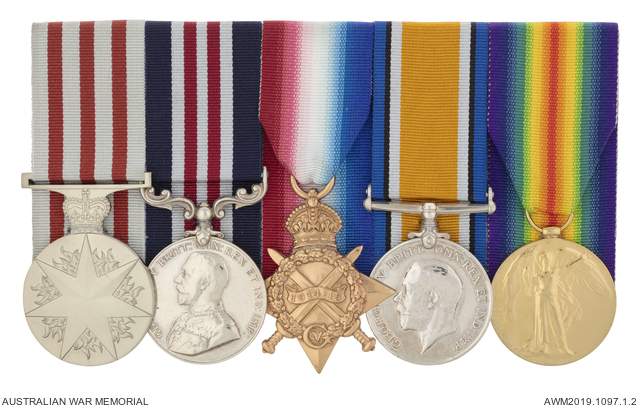| Place | Middle East: Ottoman Empire, Turkey, Dardanelles, Gallipoli, Anzac Area (Gallipoli) |
|---|---|
| Accession Number | AWM2019.1097.1.2 |
| Collection type | Heraldry |
| Object type | Award |
| Physical description | Silver |
| Place made | United Kingdom |
| Date made | c 1916 |
| Conflict |
First World War, 1914-1918 |
Military Medal: Staff Sergeant Frank (Cahir) Carr, 2nd Australian Field Ambulance, AIF

Military Medal (Geo V). Impressed around edge with recipient's details.
Thomas Francis 'Frank' Cahir was born on 23 September 1889 at Yendon, Victoria. He studied pharmacy at university before he enlisted in the AIF on 18 August 1914 under the name Frank Carr. After initial training he posted a private, service number 63, to the 2nd Australian Field Ambulance in 1914. He embarked for overseas service from Melbourne on 19 October, aboard HMAT A18 Wiltshire. After further training in Egypt Carr landed with his unit at Gallipoli on 25 April 1915. In 1916 he was awarded a retrospective Military Medal for his actions in the first month of the campaign. The recommendation for the award reads: '63 Private (now Staff Sergeant) Frank CARR. Devotion to duty and good work during the period April 25th. to May 1st. 1915 at ANZAC in continually rescuing wounded from very exposed positions single handed and carrying them to the beach under exceptionally heavy rifle and shell fire and carrying water to the trenches on his return journey.'Later in 1915, Carr, by now a staff sergeant, was evacuated sick to Lemnos and then on to Egypt. He returned to Gallipoli in October, where he joined 3rd Field Ambulance.
In France from 1916 onwards, Carr served with the 3rd, 2nd, 10th and 9th Field Ambulances, treating wounded and sick men through some of the most costly battles faced by Australians at the Somme in 1916, in Belgium in 1917, and at Villers-Bretonneux in France in 1918. For his actions near Bray in August and September 1918, Carr was recommended for the Distinguished Conduct Medal, which was not approved.
Apart from a short period in England at the end of 1916, when he was recovering from a dislocated shoulder, Carr had few breaks from service during the war. He took extended leave in Britain at the beginning of 1919, but instead of returning to Australia decided to volunteer for service with the Australian War Graves Detachment. Carr served with this unit until 1921. His work included making photographic records of grave sites for families in Australia who would never have the opportunity to visit the final resting place of their loved one. Returning to Australia by ship in 1921 he met an Irish woman, Mabel, whom he married, and had three sons – Patrick (Pat), Vincent and Jim. Cahir resumed his work as a pharmacist but like so many of his generation struggled to reconcile his experiences in a society that had little understanding of the psychological impact of war. He committed suicide on 22 May 1928. Writing to the War Records section in 1967 his wife Mabel stated: 'He died of war injuries'.
Although their father’s First World War Service had a tragic impact on the family, all three of Cahir’s sons enlisted to fight in the Second World War. Pat joined the army and served in the Pacific theatre, Jim served with Bomber Command and was taken prisoner of war, and Vincent served in the Navy. All three brothers returned home safely. In 2011, soon after the National Archives of Australia digitised their First World War service records, the brothers found that their father had been recommended for the Distinguished Conduct Medal which he had not received. Their persistent petitioning of the Australian government to right what they felt was a wrong resulted in the posthumous award of the Australian Distinguished Service Medal to Frank Cahir. In 2017, aged ninety-two, Pat Cahir was presented with the medal by the Governor of Victoria, Linda Dessau. Though his two brothers did not live to see the presentation of the medal, Pat described receiving it as 'the family miracle'.